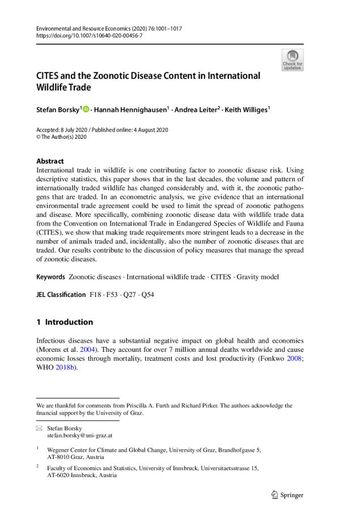Community attitudes and practices of urban residents regarding predation by pet cats on wildlife : an international comparison
- Description:
- International differences in practices and attitudes regarding pet cats' interactions with wild-life were assessed by surveying citizens from at least two cities in Australia, New Zealand, the UK, the USA, China and Japan. Predictions tested were: (i) cat owners would agree less than non-cat owners that cats might threaten wildlife, (ii) cat owners value wildlife less than non-cat owners, (iii)...
- Display date:
- 2016-04-06
- Format:
- Journal article
- Collections:
- Research Bank
- Contributors:
- Unitec Institute of Technology
- Publisher:
- PLOS ONE (Public Library of Science)
- Content partner:
- Unitec
- Availability:
- Not specified
-
Copyright status: ShareFind out more about what you are able to do with this itemMore informationUnitec has this to say about the rights status of this item:
Copyright: © 2016 Hall et al. This is an open access article distributed under the terms of the Creative Commons Attribution License, which permits unrestricted use, distribution, and reproduction in any medium, provided the original author and source are credited.
What can I do with this item?Non-infringing useNZ copyright law does not prevent every use of a copyright work, and this item may be hosted by an international institute or organisation. You should consider what you can and cannot do with a copyright work.Share itThis item is suitable for copying and sharing with others, without further permission.Check before modifyingYou'll need to confirm with the copyright holder before modifying, remixing, or building upon this item.Check about commercial useYou'll need to confirm with the copyright holder using this item for commercial purposes.
Related items
Welcome and warm Pasifik greetings
The information on this site has been gathered from our content partners.
The names, terms, and labels that we present on the site may contain images or voices of deceased persons and may also reflect the bias, norms, and perspective of the period of time in which they were created. We accept that these may not be appropriate today.
If you have any concerns or questions about an item, please contact us.
